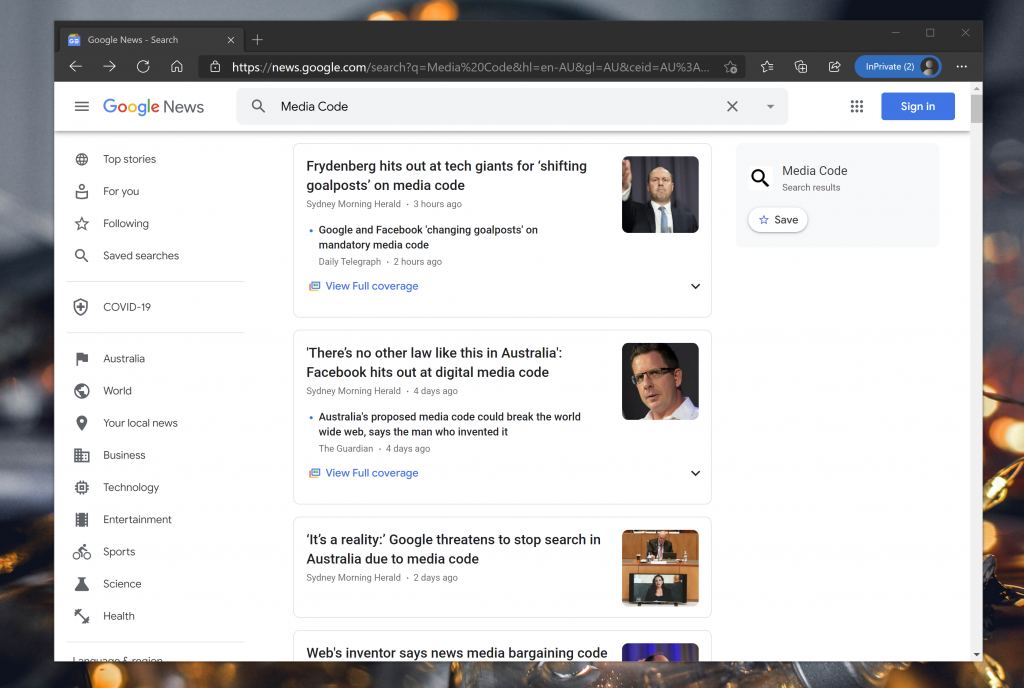
The new Media Bargaining Code proposed by the Australian Government, reached new heights of ridiculousness this week, as the Australian Senate grilled Facebook and Google executives, over the new proposed code.
This madness started back in April 2020 when the Government asked the Australian Competition and Consumer Commission (ACCC) to develop a mandatory code of conduct to address bargaining power imbalances between Australian news media businesses and digital platforms, specifically Google and Facebook.
Straight away, there are some big questions around what this scope means and why these two media companies alone would be targeted.
The new media code, would see Google and Facebook be forced to pay legacy media, to index and show their links to their contents in their news products.
If you’ve ever been to Google News, available from the News tab on any Google Search, or directly from news.google.com you’ll know that not the full article, but just the headlines are shown, which link to the source article, complete with the logo of the originating website name.
Having content indexed and showcased through search and news products, provides these outlets who have ultimately had to go online to survive, a very nice stream of referrals to their website.
The suggestion that Google should pay them for this is just ridiculous and is in complete contrast to the reality of how the internet actually works.


To remind people, publishers create original content, publish it and hope that people visit their website organically, either by going to the site directly, or finding it through a link online, usually via a search.
In Facebook’s case, there is actually an experience that does let users read full articles without visiting the publisher’s website, known as Facebook Instant Articles. The problem is, published have to actively make the decision to enable this, much like Google’s implementation of AMP, these user-first reading experiences have to be enabled by developers at the organisation.
In the last decade, social media has been a massive boost to driving traffic to websites and when the organic and free techniques don’t meet the traffic targets, that’s when companies get out the credit card and pay for advertising on platforms like Google And Facebook, but there plenty of others.
What that ‘power imbalance’ effectively refers to is that legacy news outlets see the profits of these international powerhouses and want a slice of it to fund their transition to an online business as the web continues to steal eyeballs from their media outlets.
This legacy media are so desperate to push their case that they’re willing to denounce any new, natively online business by pulling the trusted and credibility card, sighting the fact that their organisation has been around for more than 100 years.
Like legacy auto is finding out, tradition and history counts for nothing in the digital era, content is king and it’s time to stop pretending you’re all journalists are a superior breed of humans when most articles headlines are complete link bait, no better than the Daily Mail.
Facebook and Google both have massive audiences and make massive profits (which I’m sure is why they’re being targeted), but there are alternatives. You could consume 100% of your news via Reddit, Twitter or Yahoo and you could search on Bing, or DuckDuckGo, so this suggestion that Google and Facebook are ‘the Internet’ is a symptom of them making really great services people enjoy.
If these were Australian companies, not US-based ones, I think we’d be celebrating them, instead of trying to make them pay to play in our playground.
One of the most egregious conditions carved out in the terms and conditions of who would get paid under this new code, is that eligible news media business’s annual revenue must exceed $150,000, in either the most recent financial year or in three out of the five most recent financial years. This means legacy businesses are given an unfair advantage over any startup news organisations yet to hit these numbers.
On 31 July 2020 the ACCC released a draft code for public consultation and a series of questions and answers (Q&As) about the draft code.
Following consultation, the ACCC made recommendations to Government based on the views put forward by stakeholders. Government has now considered these recommendations and developed its final legislation.
The Bill was introduced to Parliament on 9 December 2020 and is available at: Treasury Laws Amendment (News Media and Digital Platforms Mandatory Bargaining Code) Bill 2020.
This will go down in history as one of the most embarrassing attempts by legacy media to get compensated for its failure to adapt to the internet.
Unfortunately, they managed to recruit politicians in their efforts, supported by even the top job, Prime Minister of this country.
The reality is this. Most everyday Australians will never care about proposed payments between Facebook and NewsCorp, or Google and Murdock. They will absolutely care if Google or Facebook alter their services or withdraw completely from the Australian market as they have proposed as the last resort, but still possible.
Ultimately there are no votes to be won here, but plenty to be lost. If this goes as poorly as it has been to date, the ramifications of this, to small businesses and everyday Australians just enjoying their online services, could take down a Government.
This week Google and Facebook both sent representatives to answer questions during Senate Estimates and have both voiced strong opposition to the proposed code. The suggestion is that if they don’t come to the bargaining table and agree to compromise, they will have legislation proposed upon them to provide services to Australians.
Mel Silva, Managing Director for Google Australia, even released a video on YouTube explaining their position on News Media Bargaining Code.
During Estimates, legacy media were grilled about how they’d deploy any potential revenue raised through the code. They were unwilling to commit to hiring more journalists and admitted that the funds could be use to ‘plug gaps’. This translates to being able to use the funds at their discretion, which made no commitment to improving the quality of investigative journalism, something they heavily promoted as the reason why this code needed to happen.
While operations in this country create sizable revenues for both Google and Facebook, having a code here in Australia, be successfully introduced, would then see Governments around the world follow suit. That means an agreement to the code would not simply be an Australian one, but potentially set a precedence for other nations also looking to prop up failing legacy media businesses.
The Government needs to bury their pride on this, admit they got it wrong and get back to focusing on making multi-nationals pay their fair of tax.
Here are some Tweets I posted during Senate Estimates.

Excellent article Jason.
The utter ignorance of the news publications to bite the hand that feeds them. If they believed they weren’t getting a fair deal, they would remove themselves from such platforms and not actively share their articles on social media. But they know this would be economically disastrous for them.
This legislation is anti-competitive and shows a gross mis-understanding of how 21st century media works.
There’s no direct votes to be won, however when election comes along it will be remembered that the government effectively taxed tech giants and put the money directly in newspapers pockets
What’s the deal? This is a legit free marketing platform for media companies.. don’t bite the hand that feeds. Why isn’t Twitter being forced to pay news companies? Or Apple?